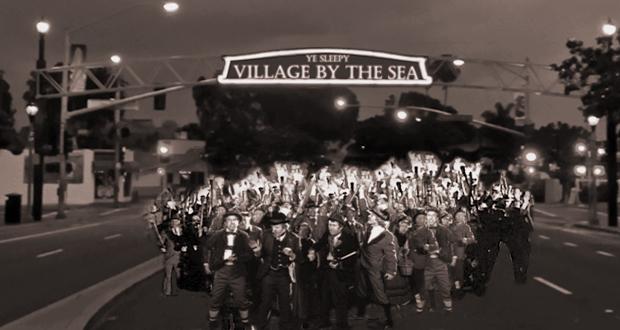The Rise of the Little People
By: Richard Riehl
 nce upon a time, in the land of pink-tiled roofs, the clueless King Hallmat of the Village-by-the-Sea was troubled as he sat on his throne. The Little People were at the castle gates, carrying torches and pitchforks, chanting, “Down with the king! Down with the king!” His subjects were angry because he brought to the village the slippery Sir Caresnot, the black knight of Tinsel Gridloc, the largest kingdom in the land, 1,000 furlongs to the north.
nce upon a time, in the land of pink-tiled roofs, the clueless King Hallmat of the Village-by-the-Sea was troubled as he sat on his throne. The Little People were at the castle gates, carrying torches and pitchforks, chanting, “Down with the king! Down with the king!” His subjects were angry because he brought to the village the slippery Sir Caresnot, the black knight of Tinsel Gridloc, the largest kingdom in the land, 1,000 furlongs to the north.
A stonemason by trade, the black knight was known for despoiling one-of-a-kind villages with identical temple squares honoring Plutus, the god of wealth. His grandest, The Grovel at Tinsel Gridloc, brought streams of carriage traffic from beyond what the eye could see.
Sir Caresnot’s growing homage to Plutus rewarded him handsomely. His fortune of one billion gold coins was built atop a generous inheritance from his father, Sir Ornery of Gridloc, once sent to the dungeon for a year as punishment for lying to buyers of the carriages he sold them. The black knight had evidently inherited more than gold from his father.
Sir Caresnot rubbed his hands together and smiled at the thought of visiting the sleepy little Village By The Sea. He knew its Little People were ruled by King Hallmat the Clueless and his Dim Knights of the Rectangle, known as the happiest rulers in the land because they always agreed with one another on the answer to every question brought before them.
Sadly, as if by habit, upon every opportunity the Little People pledged their loyalty to their self-satisfied superiors.
Sir Caresnot wanted to build his temple to Plutus on land the Little People set aside for its scenic splendor. To do so he would have to woo the King and his Dim Knights, while hiding the truth from the Little People that his temple square would destroy forever the beauty of the land they loved.
The black knight knew it would be easy to gain the friendship of the village rulers. He’d simply show them how his temple would bring great wealth to the village without costing them a single gold coin.
But he also knew it would take more cunning to win over the Little People. He would have to dress wolves in sheep’s clothing and send them from cottage to cottage to ask the villagers to “help save the ground on which their precious berries made of straw were grown.” He’d promise they could find out more about his plan and speak up about it before he would go near their protected land.
Sir Caresnot’s falsehood went unchallenged by King Hallmat and his Dim Knights. They were so smitten with his promises they didn’t bother to find out how he planned to keep them.
But what everyone failed to foresee was the rising up of the Little People who, after discovering they’d been tricked, demanded that the King and his beknighted underlings allow all villagers to speak their minds for or against Sir Caresnot’s devious plan.
And speak they did. The black knight was banished from the Village-by-the-Sea. He returned to Tinsel Gridloc, where he was welcomed home with open arms.
And so it came to pass that the happiest rulers in the land of pink-tiled roofs found themselves out of work. The Little People found less jolly, but much wiser, rulers who helped them keep the beauty of their protected land the truly right way…so they could live happily ever after.
At its meeting on Tuesday, November 17, the Carlsbad City Council will be bound by a successful citizen’s referendum to repeal their August 25 approval of a developer’s plan to build a mega-mall on the shore of one of the city’s three lagoons, or
#1. Put the plan before city voters in a Special Election in not less than 88 days, or
#2. Place it on the ballot of the 2016 General Election.

Richard J. Riehl is a Carlsbad, California resident, retired university administrator, and award-winning columnist for the former daily newspaper, the North County Times.
Richard writes a blog titled The Riehl World
You can follow him on Twitter
and Like him on Facebook




